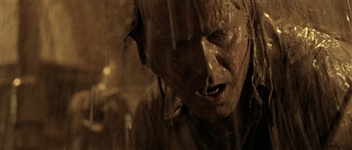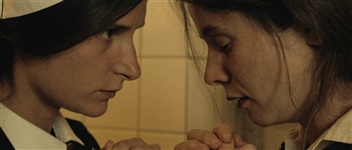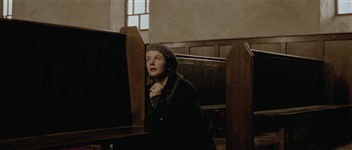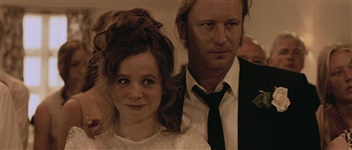Breaking The Waves (1996)
.jpg)
Bess grows up in a closed, remote Scottish community absorbing their deeply conservative version of Christianity. Somehow she meets Jan, a worker on a North Sea oil rig, and they get married. When Jan's job takes him back to the rig Bess finds the separation difficult and prays for him to return swiftly. Her prayer is answered in the least helpful way.
There are few directors as confrontational as Lars Von Trier, and Breaking The Waves can almost be considered an assault on the audience. The fact I'd been stalled at this point in the Curzon boxset until today, when I was off work with a debilitating toothache, tells you all you need to know.
The stark, naturalistic style of the film foreshadows the Dogme 95 movement he founded, though it isn't officially part of the canon and does violate several of its principles. It shares the movement's focus on cast and characters though, and on challenging the audience - not actually a Dogme rule, but probably the thing that most unifies the films and filmmakers attached to it.
Bess is a simple, child-like woman who is subjected to a harrowing ordeal - partly through her own actions, but her naivety means she can hardly be held culpable. Indeed her warmth of heart is depicted as a virtue and contrasted with the cold, rigid intellectualism of her community, even as it drags her and the viewer into a nightmare.
Emily Watson's performance is extraordinary, exposing herself emotionally in a way that makes the viewer feel almost as vulnerable as Bess herself. It's hard to think of many comparable experiences, other than Von Trier's next two films The Idiots and DANCER IN THE DARK. Together they apparently constitute The Golden Heart Trilogy, though I don't know if Von Trier conceived them as such in advance.
The rest of the cast cast also deliver, on a smaller scale - Katrin Cartlidge in particular provides essential support, and Stellan Skarsgård understands exactly how much not to steal focus from Bess in their scenes together.
On the surface the film is an attack on the hypocrisy of this bible-bashing community's lack of Christian charity, but its actually quite mild in its rebuke - allowing dismissive contempt to make the case more than outright condemnation.
Breaking The Waves was a breakthrough film for its director, delivering the critical success he had probably always believed was his due, and a measure of commercial success sufficient to establish Lars Von Trier as a director of note, ensuring his name would be enough to bring attention to future projects.
In some ways Breaking The Waves walked so that Dancer In The Dark could... well, dance I guess, though "stab you in the neck" might be a more accurate metaphor. No doubt there are many viewers who think the latter oversteps lines that this film just about stays on the right side of, though. For me the excess is a feature not a bug though.
Cast
Crew
| Director | |
|---|---|
| Writer | |
| Editor | |
| Cinematographer |







